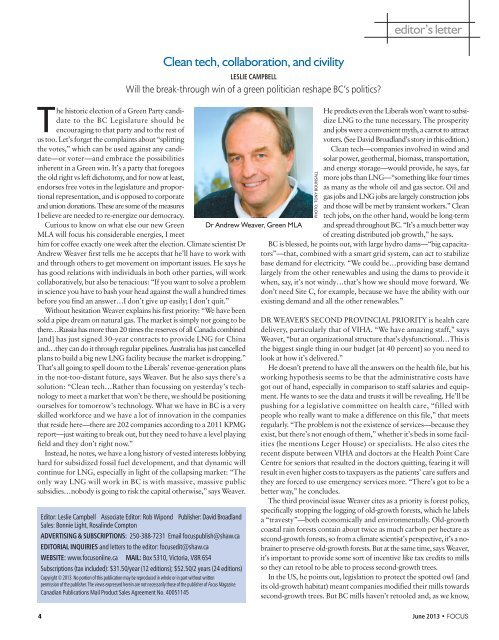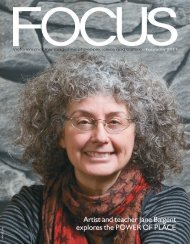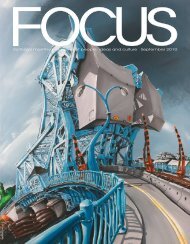***Mar 2006 Focus pg 1-32 - Focus Magazine
***Mar 2006 Focus pg 1-32 - Focus Magazine
***Mar 2006 Focus pg 1-32 - Focus Magazine
You also want an ePaper? Increase the reach of your titles
YUMPU automatically turns print PDFs into web optimized ePapers that Google loves.
editor’s letterThe historic election of a Green Party candidateto the BC Legislature should beencouraging to that party and to the rest ofus too. Let’s forget the complaints about “splittingthe votes,” which can be used against any candidate—orvoter—and embrace the possibilitiesinherent in a Green win. It’s a party that foregoesthe old right vs left dichotomy, and for now at least,endorses free votes in the legislature and proportionalrepresentation, and is opposed to corporateand union donations. These are some of the measuresI believe are needed to re-energize our democracy.Curious to know on what else our new GreenMLA will focus his considerable energies, I meethim for coffee exactly one week after the election. Climate scientist DrAndrew Weaver first tells me he accepts that he’ll have to work withand through others to get movement on important issues. He says hehas good relations with individuals in both other parties, will workcollaboratively, but also be tenacious: “If you want to solve a problemin science you have to bash your head against the wall a hundred timesbefore you find an answer…I don’t give up easily; I don’t quit.”Without hesitation Weaver explains his first priority: “We have beensold a pipe dream on natural gas. The market is simply not going to bethere…Russia has more than 20 times the reserves of all Canada combined[and] has just signed 30-year contracts to provide LNG for Chinaand…they can do it through regular pipelines. Australia has just cancelledplans to build a big new LNG facility because the market is dropping.”That’s all going to spell doom to the Liberals’ revenue-generation plansin the not-too-distant future, says Weaver. But he also says there’s asolution: “Clean tech…Rather than focussing on yesterday’s technologyto meet a market that won’t be there, we should be positioningourselves for tomorrow’s technology. What we have in BC is a veryskilled workforce and we have a lot of innovation in the companiesthat reside here—there are 202 companies according to a 2011 KPMGreport—just waiting to break out, but they need to have a level playingfield and they don’t right now.”Instead, he notes, we have a long history of vested interests lobbyinghard for subsidized fossil fuel development, and that dynamic willcontinue for LNG, especially in light of the collapsing market: “Theonly way LNG will work in BC is with massive, massive publicsubsidies…nobody is going to risk the capital otherwise,” says Weaver.Clean tech, collaboration, and civilityLESLIE CAMPBELLWill the break-through win of a green politician reshape BC’s politics?Editor: Leslie Campbell Associate Editor: Rob Wipond Publisher: David BroadlandSales: Bonnie Light, Rosalinde ComptonADVERTISING & SUBSCRIPTIONS: 250-388-7231 Email focuspublish@shaw.caEDITORIAL INQUIRIES and letters to the editor: focusedit@shaw.caWEBSITE: www.focusonline.ca MAIL: Box 5310, Victoria, V8R 6S4Subscriptions (tax included): $31.50/year (12 editions); $52.50/2 years (24 editions)Copyright © 2013. No portion of this publication may be reproduced in whole or in part without writtenpermission of the publisher. The views expressed herein are not necessarily those of the publisher of <strong>Focus</strong> <strong>Magazine</strong>.Canadian Publications Mail Product Sales Agreement No. 40051145Dr Andrew Weaver, Green MLAHe predicts even the Liberals won’t want to subsidizeLNG to the tune necessary. The prosperityand jobs were a convenient myth, a carrot to attractvoters. (See David Broadland’s story in this edition.)Clean tech—companies involved in wind andsolar power, geothermal, biomass, transportation,and energy storage—would provide, he says, farmore jobs than LNG—“something like four timesas many as the whole oil and gas sector. Oil andgas jobs and LNG jobs are largely construction jobsand those will be met by transient workers.” Cleantech jobs, on the other hand, would be long-termand spread throughout BC. “It’s a much better wayof creating distributed job growth,” he says.BC is blessed, he points out, with large hydro dams—“big capacitators”—that,combined with a smart grid system, can act to stabilizebase demand for electricity. “We could be…providing base demandlargely from the other renewables and using the dams to provide itwhen, say, it’s not windy…that’s how we should move forward. Wedon’t need Site C, for example, because we have the ability with ourexisting demand and all the other renewables.”PHOTO: TONY BOUNSALLDR WEAVER’S SECOND PROVINCIAL PRIORITY is health caredelivery, particularly that of VIHA. “We have amazing staff,” saysWeaver, “but an organizational structure that’s dysfunctional…This isthe biggest single thing in our budget [at 40 percent] so you need tolook at how it’s delivered.”He doesn’t pretend to have all the answers on the health file, but hisworking hypothesis seems to be that the administrative costs havegot out of hand, especially in comparison to staff salaries and equipment.He wants to see the data and trusts it will be revealing. He’ll bepushing for a legislative committee on health care, “filled withpeople who really want to make a difference on this file,” that meetsregularly. “The problem is not the existence of services—because theyexist, but there’s not enough of them,” whether it’s beds in some facilities(he mentions Leger House) or specialists. He also cites therecent dispute between VIHA and doctors at the Health Point CareCentre for seniors that resulted in the doctors quitting, fearing it willresult in even higher costs to taxpayers as the patients’ care suffers andthey are forced to use emergency services more. “There’s got to be abetter way,” he concludes.The third provincial issue Weaver cites as a priority is forest policy,specifically stopping the logging of old-growth forests, which he labelsa “travesty”—both economically and environmentally. Old-growthcoastal rain forests contain about twice as much carbon per hectare assecond-growth forests, so from a climate scientist’s perspective, it’s a nobrainerto preserve old-growth forests. But at the same time, says Weaver,it’s important to provide some sort of incentive like tax credits to millsso they can retool to be able to process second-growth trees.In the US, he points out, legislation to protect the spotted owl (andits old-growth habitat) meant companies modified their mills towardssecond-growth trees. But BC mills haven’t retooled and, as we know,4 June 2013 • FOCUS
















